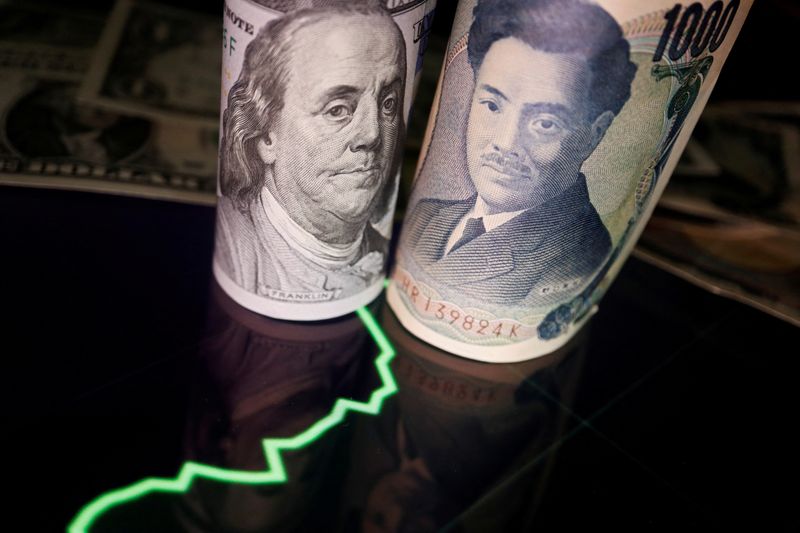By Chuck Mikolajczak, Saqib Iqbal Ahmed and Lucy Raitano
NEW YORK/LONDON/TOKYO (Reuters) -The yen strengthened sharply against the dollar on Tuesday, leading some market participants to believe Japanese policymakers had intervened to support the currency, although others said the size of the move was not convincing enough.
Traders have been on watch for weeks for a possible intervention by Japanese officials to combat a sustained depreciation in the yen.
Tuesday's move saw the dollar break above the 150 level for the first time since October 2022, before tumbling to a low of 147.30 as the yen surged.
"It has all the hallmarks of intervention," said Michael Brown, market analyst at Trader X in London. "It would have to be an incredible coincidence for it not to be."
The dollar rose as high as 150.165 against the yen. It was recently at 148.76 yen.
Some analysts noted that Tuesday’s move in the yen was far smaller than when policymakers intervened last year to support the currency. The yen jumped about 4%, peak to trough, when Japan intervened in September and October of 2022, compared to Tuesday’s move of roughly 2%.
"It could just be people expecting intervention and then reacting to what they believed to be intervention," said Colin Asher, senior economist at Mizuho in London.
"That said, it's quite rare for a currency to move so aggressively in such a short amount of time without some reason. Such a move is usually intervention."
The 150 level is one that many traders suspect could mark the point at which Japanese authorities, who have reiterated their concern about excessive volatility and currency weakness, could intervene.
A senior Japanese ministry of finance official declined to comment on whether Japan had intervened in foreign exchange markets. The New York Federal Reserve did not respond to requests for comment.
"The market is obviously very nervous around these levels at 150. For me, it's nervousness with traders cutting their long positions," said Niels Christensen, chief analyst at Nordea in Copenhagen. "I imagine if this was intervention then they would confirm it to make the most of it."
To support the Japanese currency, authorities need to tap Japan's foreign reserves of dollars to sell for yen. The finance minister issues the order to intervene, and the Bank of Japan executes the order as the ministry's agent.
Some market participants said the BoJ may have been conducting so-called rate checks, where central bank officials call dealers and ask for buying or selling rates for the yen. This is seen by traders as a possible precursor to intervention.
"One of our traders thinks it was a bit of price checking rather than explicit action for now but it's unclear," said Jeremy Stretch, head of G10 FX strategy at CIBC Capital Markets in London. "Some people might think this was a shot across the bows from the BOJ."
SUSTAINED FALL
Japanese authorities are facing renewed pressure to combat a sustained depreciation in the yen as investors eye prospects of higher-for-longer U.S. interest rates, while the Bank of Japan remains wedded to its policy of super-low interest rates.
The yen has fallen about 12% against the dollar year-to-date, as a rebound in the U.S. currency has picked up steam in recent months - in many cases complicating the outlook for other central banks.
The yen's weakness has been seen as problematic, with Japanese firms having shifted production overseas and the economy heavily reliant on imports for goods ranging from fuel and raw materials to machinery parts.
Some analysts thought Tokyo might explain the move.
"The Ministry of Finance releases official intervention data at the end of the month, but we should not be surprised if they have a press event or if a key official comes out with a comment early in Asia," wrote Edward Moya, senior market analyst at OANDA in New York.
Japan's policymakers also consider it important to seek the support of Group of Seven partners, notably the United States if the intervention involves the dollar.
Japan bought yen in September 2022, its first foray into the market to protect its currency since 1998, after a Bank of Japan (BOJ) decision to maintain an ultra-loose monetary policy drove the yen as low as 145 per dollar. It intervened again in October last year after the yen plunged to a 32-year low of 151.94.
Plenty of catalysts remain to fuel more gains in the dollar, meaning there could be more headaches in store for policymakers in Japan and other countries.

A stronger-than-expected number in Friday's U.S. employment report, for instance, could bolster the case for Fed hawkishness and push up the dollar, which is on track for its 12th straight week of gains against a basket of currencies.
"With NFP payrolls around the corner, some traders thought intervention would most likely wait until later in the week," Moya wrote.